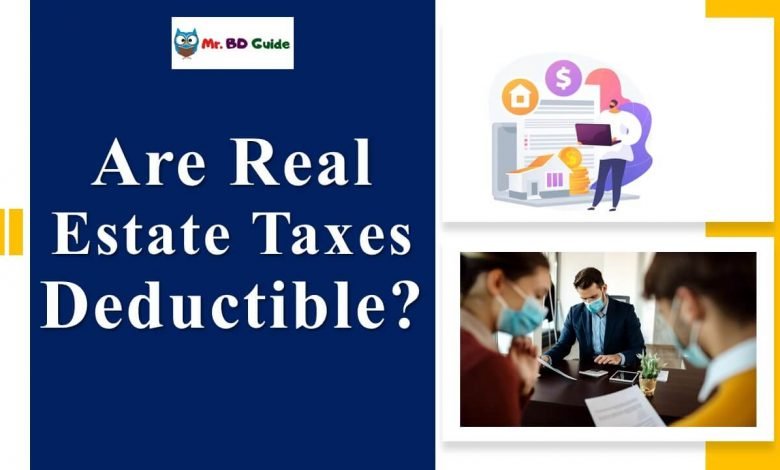Are Real Estate Taxes Deductible?

Are real estate taxes deductible? We have explained everything to you in this article. The Internal Revenue Service reminded taxpayers on January 24, 2022. The new tax season had started, and people who sent in their returns early were less likely to have to wait for their refunds.
To help reduce the amount of federal income tax you owe, you may be eligible for a property tax deduction this year.
State and local taxes qualify for a tax write-off if they are uniformly levied (meaning they are applied at the same rate to all properties), and the funds are put to good use by the state or local government. Take a look at the details of the property tax deduction and who can qualify.
One of the biggest rewards of home ownership is the ability to deduct mortgage interest and property taxes, but you do not have to be a homeowner to take advantage of this reward.
It is possible to get the same thing by doing other things, too. However, real estate agents and brokers can help you get information regarding taxes. But remember that they can’t give you appropriate information. They can only help you get in touch with the right person. So as long as we are getting into the practical details, if you are wondering whether or not real estate taxes are deductible, go ahead and ask.
Are Real Estate Taxes Deductible?
No, not all real estate taxes are deductible. You cannot define it with yes or no because some real estate taxes are deductible and some of them are not deductible. So, you have to know all those real estate items/products/properties to know the details. We can add two different lists where deductible and non-deductible real estate taxes will be listed.
Taxes paid on a home may be used as a tax deduction. If you have to pay property taxes, you may write them off. You must have sent the appropriate amount to the appropriate taxation authority (either directly or via an escrow account) at the time of settlement or closure, or throughout the year.
What Is A Property Tax Deduction?
Now that tax season is among us, you may be able to lower your owed tax amount or raise your refund by deducting taxes that you have previously paid.
Taxes collected by state and municipal governments are deductible against federal income taxes. The property tax credit does not apply to fees associated with house improvements or housing services like garbage collection. Commercial, rental, and other property taxes paid on real estate that is not held by the taxpayer are similarly non-deductible.
State and local taxes, including property taxes, are capped at a $5,000 deduction for single filers and a $10,000 deduction for married filers as of tax returns for 2018 and beyond.
According to the Internal Revenue Service, you may only deduct up to $10,000 in state and local income, sales, and property taxes. The amount for married taxpayers who file separately is $5,000. All state and local taxes paid by a taxpayer that exceed this limit are nondeductible.
The property tax deduction enables homeowners to deduct from their federal income taxes the amount of state and local taxes that they have paid on their property during the previous year.
This includes the property taxes that are due annually based on the assessed value of your home as well as any taxes that may have been paid in full at the time of closing on the property, whether you were selling or buying it.
It is important to remember, however, that you cannot deduct the taxes that you pay on items like home improvements or municipal services that are stated on your tax statement, such as garbage collection.
Are Property Taxes Deductible in 2022
If you are filing your taxes as an individual, the total amount of your state and local income, sales, and property tax deductions cannot exceed $10,000. If you are married but filing separately, this amount drops to $5,000. There is a possibility that some of the other itemized deductions you take will also be subject to a restriction.
Deductible Property Taxes
The following is a short list of the property taxes that may be subtracted from the total amount of taxes you owe.
- Primary Home
- Vacation Home
- Land
- Vehicles
- Boats
- Co-op Apartment (see IRS publication 530 for special rules)
- Property Outside the United States
Non-Deductible Property Taxes
Here is a list of items that you cannot write off on your taxes.
- Paying Tax On A Piece Of Property You Don’t Even Own
- You Have Paid A Business Or Rental Property Tax
- Your Outstanding Tax Bill
- Sales Taxes Paid When A Home Is Bought Or Sold
- Improvements To One’s Dwelling
- Funding For Investments In Renewable Energy Or Other Environmentally Friendly Practices
- Rebuilding And Repairing One’s Immediate Environment
- Trash Collection And Water Are Examples Of Utilities
- Home Renovation Loan Payments. (Your mortgage interest may be tax-deductible.)
- More than $10,000 ($5,000 if married filing separately) for property taxes and income or sales taxes.
How Does The Property Tax Deduction Work?
If you opt to itemize your deductions on your tax return, then and only then may you take advantage of the deduction for property taxes. This is by far the most crucial rule to keep in mind. If you take the standard deduction, you cannot deduct any of your other expenses, including your property taxes.
It is up to you to determine which choice will have the least negative impact on your finances. It is important to do the arithmetic and make a decision that is in your best interest since, depending on the specifics of your life, the standard deduction can save you more money than itemizing your deductions would.
The federal government allows taxpayers the option of either using the standard deduction or itemizing their property tax deductions. This sum is deducted from your annual taxable income, reducing the amount of tax that you may owe.
If you paid $10,000 in property taxes in 2021 out of a total income of $60,000, for instance, you would be eligible to deduct $10,000 from your taxable income. For tax purposes, the sum of $50,000 represents the maximum taxable income for the year.
An escrow account is a way for some homeowners to save money each month to pay their annual property taxes. This prevents the taxpayer from underpaying property taxes and then owing more money to the government when tax returns are due.
How Much of Your Property Taxes are Tax
Deductible?
The amount that may be deducted for SALT (state and local taxes) related property taxes have been increased to $10,000 from the previous $5,000 limit. Property taxes, combined with either state and local income taxes or sales taxes, are eligible for a deduction of up to $10,000 ($5,000 if married filing separately) on your federal income tax return.
You should check with your tax advisor to see whether you are eligible to deduct the property and real estate taxes that you pay on your Primary residence. cooperative apartment (see IRS publication 530 for special rules).

Can You Deduct Taxes If You Don’t Itemize?
No, you do not need to itemize to enjoy these generous tax breaks.
The Internal Revenue Service (IRS) provides a variety of tax benefits available to taxpayers, and one of the best ways to take advantage of these discounts is to itemize deductions on your tax return.
However, for you to benefit from itemizing your deductions, the sum of those deductions must be more than the standard deduction to which you are entitled. The standard deduction is subject to vary from one tax year to the next. In 2021, it is.
- $12,550 For Taxpayers Submitting Their Taxes As Singles Or Married Couples Filing Their Taxes Separately.
- The Standard Deduction For Married Couples Filing Jointly Is $25,100.
- $18,800 For The Primary Breadwinner In A Family.
Having said that, even if you do not itemize your deductions on your tax return, there are still certain tax breaks that you may be able to claim. Here are a few that could be relevant to your situation.
IRA Contributions
IRA contributions are tax-deductible up to the annual limit. You may deduct $6,000 in IRA contributions if you are under 50 or $7,000 if you are 50 or over in 2020 and 2021. SEP and SIMPLE IRA contributions also count.
SEP IRAs top out at $57,000 in 2020 and $58,000 in 2021 regardless of age, while SIMPLE IRAs max out at $13,500 for employees under 50 and $16,500 for those 50 and over in 2020 and 2021. Roth IRA donations are not tax-deductible.
HSA Contributions
HSA donations are tax-deductible like IRAs. If you are under 55, you may deduct $3,550 for self-only coverage in 2020; if you are 55 or older, $4,550.
The 2021 limitations are $3,600 and $4,600. If you are under 55, you may contribute $7,100 to a family HSA in 2020; those 55 and over can contribute $8,100. 2021 limitations are $7,200 and $8,200.
Self-employment Tax
When your employer withholds taxes, you pay half of your yearly Social Security and Medicare taxes. Self-employed people pay Social Security and Medicare taxes in addition to self-employment taxes.
You will pay 12.4% of your income up to $137,700 in 2020 and $142,800 in 2021. 2.9% of your salary goes to Medicare. You may deduct half of your self-employment tax.
Educator Expenses
Teachers buy school materials using their own money. Educator expenditures are tax-deductible up to $250. Keep purchasing receipts.
Health Insurance Premiums
Self-employed people may deduct their own and their family’s health insurance premiums. Salaried workers with employer-provided insurance cannot use this deduction.
Student Loan Interest
You may deduct up to $2,500 in student loan interest if you do not claim yourself as a dependent. Single filers with MAGIs up to $70,000 will obtain a full deduction in 2020 and 2021.
The deduction phases off if your MAGI surpasses $85,000. Married couples filing jointly may deduct student loan interest up to $140,000 MAGI. Once your MAGI surpasses $170,000, the credit vanishes.
Charitable Donations
Itemizers may deduct charitable gifts. In 2020, you may deduct $300 without itemizing. $300 applies to solo and joint filers. In 2021, you may deduct $300 per person if you are single, but $600 if you are married and filing jointly.
Alimony Payments
If you completed your divorce in 2018, you may be able to deduct alimony payments. If you amend your divorce arrangement after 2018, you will lose this deduction.
Property Tax Deduction Limit in 2022
The new restriction on deducting state and local property taxes might have a significant financial effect on many people, but careful estate planning could help mitigate this. Methods that could be used include:
Investigate the possibility of devoting a portion of your home to your company, since this may result in a tax break. Is there a chance you might rent out a portion of your house or turn it into an office that would qualify as a tax write-off for your business?
It is possible to establish a non-grantor trust that is a tax-paying entity distinct from the individual founding and supporting the trust by transferring real estate to a limited liability corporation (LLC).
When applicable, the trust may be able to take its own SALT deduction of up to $10,000. For the trust to qualify for the SALT deduction, it must possess investments that produce taxable income.
Property Tax Deduction in 2022
If you are filing your taxes as an individual, the total amount of your state and local income, sales, and property tax deductions cannot exceed $10,000. If you are married but filing separately, this amount drops to $5,000. There is a possibility that some of the other itemized deductions you take will also be subject to a restriction.
Are Property Taxes Deductible in Texas?
Texas assesses and administers property tax locally. State property tax is nonexistent. Local governments use property tax to pay for schools, roads, police and firefighters, emergency response services, libraries, parks, and other services.
Texas grants partial or entire exemptions from assessed property values used to calculate property taxes. A partial exemption exempts a portion of a property’s assessed worth from taxes. Total exemption exempts the whole assessed value from taxes. Taxing entities must give some obligatory exemptions and may offer others locally (local option).
Property tax exemptions usually need applications. The property’s appraisal district accepts exemption applications. The exemption application date is May 1. Appraisal district chief appraisers decide whether a property is exempt.
Exemption rules are broad. Owners should study relevant laws. Property Tax Exemptions (PDF) provides a summary of the exemptions.
Is Mortgage Interest Deductible?
For first and/or second residences with mortgages up to $750,000 in value, the interest paid on the loan is tax deductible.
The dwelling has to meet the criteria for an eligible property, which includes a house, condominium, mobile home, boat, or trailer as long as it has facilities for cooking and sleeping.
If you want to deduct the cost of your mortgage interest, you have to itemize your deductions on your tax return rather than just taking the standard deduction.
Finishing Words on Real Estate Taxes Deduction
There are many financial advantages to becoming a homeowner, particularly when it comes time to file taxes. Homeowners need to have a thorough understanding of precisely what may be deducted and how the capped amount compares to the amount of money they might save by taking advantage of the standard deduction to maximize the potential financial benefits of the property tax deduction.
As a result of the ongoing rise in the size of the standard deduction, an increasing number of individuals are concluding that the advantages offered by this alternative exceed those of the itemized deductions. So give serious consideration to your budget, and make your decision based on what will provide you the most financial benefit.
And if you do not already own a house but are considering the financial advantages of doing so, now is an excellent time to discuss your options with a Home Loan Expert and get the application process started.




